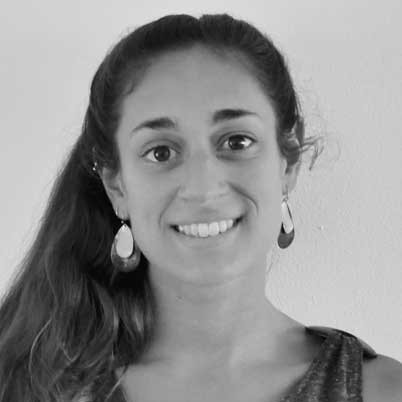
Mikaela Pisani
Digital Leader
Uruguay
Girls in Tech
I have been in the technology industry for almost a decade. In 2003, I started working for Netlabs as a junior developer until I became a team leader. I worked primarily designing microservices, middleware architectures, and fault-tolerant systems, as well as implementing ETLs for a big data platform. In 2016, I finished college with a degree in Computer Engineering. In 2018, I was granted a Fulbright scholarship, which allowed me to study at Texas Tech University and get a master’s degree in Data Science. During that period, I gained valuable experience working as a research assistant. After finishing my studies, I returned to Netlabs as a Big Data Developer. Soon after, I took on my current role at Rootstrap as Data Science Team Leader, where I apply machine learning algorithms to extract value from data. I’m also part of the AI research team at ORT University.
I’ve always been interested in the intersection of art, science, and technology. In particular, over the last year, I became interested in the intersection of AI and neuroscience, so I became part of an interdisciplinary group called ANT, "Art & Neurosciences & Technology" (Arte & Neurociencias & Tecnología), which got together to do artistic research on questions such as: Can humans and algorithms complement each other to create art? How is the map of brain activity when we create, interpret, and observe a work? In this framework, we are presenting an exhibition at the EAC museum called BIOFEEDBACK-jam.
I’m also part of a community called Fibras, which seeks to create social impact projects with technology.
I’ve been quoted in several publications, most recently LifeWire, International Business Times, and BBC News. I’ve also been a speaker at conferences and events, including the Women in Tech Global Conference 2021, where I hosted a session called “How women should be involved in data science to prevent bias in algorithms.”
Since 2017, I’ve been involved in Girls in Tech. This international non-profit organization seeks to inspire girls to study technology by promoting STEAM skills and conducting multiple workshops and talks. Since 2020, I’ve served as Co-Managing Director. In Uruguay, our mission is to encourage gender equity in education, collaborative and interdisciplinary work, and the use of technology as a tool. One of the most important events we organized this year was 'Jugar Mundos,’ where children could discover the world of science, technology, robotics, music, theatre, and more, bringing together different institutions that align with our goals and working together to nourish the generations of the future.
I’ve always been interested in the intersection of art, science, and technology. In particular, over the last year, I became interested in the intersection of AI and neuroscience, so I became part of an interdisciplinary group called ANT, "Art & Neurosciences & Technology" (Arte & Neurociencias & Tecnología), which got together to do artistic research on questions such as: Can humans and algorithms complement each other to create art? How is the map of brain activity when we create, interpret, and observe a work? In this framework, we are presenting an exhibition at the EAC museum called BIOFEEDBACK-jam.
I’m also part of a community called Fibras, which seeks to create social impact projects with technology.
I’ve been quoted in several publications, most recently LifeWire, International Business Times, and BBC News. I’ve also been a speaker at conferences and events, including the Women in Tech Global Conference 2021, where I hosted a session called “How women should be involved in data science to prevent bias in algorithms.”
Since 2017, I’ve been involved in Girls in Tech. This international non-profit organization seeks to inspire girls to study technology by promoting STEAM skills and conducting multiple workshops and talks. Since 2020, I’ve served as Co-Managing Director. In Uruguay, our mission is to encourage gender equity in education, collaborative and interdisciplinary work, and the use of technology as a tool. One of the most important events we organized this year was 'Jugar Mundos,’ where children could discover the world of science, technology, robotics, music, theatre, and more, bringing together different institutions that align with our goals and working together to nourish the generations of the future.